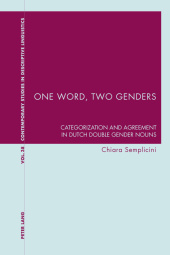 Neuerscheinungen 2016Stand: 2020-02-01 |
Schnellsuche
ISBN/Stichwort/Autor
|
Herderstraße 10
10625 Berlin
Tel.: 030 315 714 16
Fax 030 315 714 14
info@buchspektrum.de |

Chiara Semplicini
One Word, Two Genders
Categorization and Agreement in Dutch Double Gender Nouns
2016. XXII, 397 S. 225 mm
Verlag/Jahr: PETER LANG, PIETERLEN 2016
ISBN: 3-03-430927-9 (3034309279)
Neue ISBN: 978-3-03-430927-1 (9783034309271)
Preis und Lieferzeit: Bitte klicken
This first academic study of double gender nouns (DGNs) in the Dutch language investigates why certain nouns have more than one gender. DGNs are shown to be part of a generalized restructuring of Dutch gender as a whole, and this study shows them to be catalysts in the transition towards a (more) semantic system.
Dutch is a peculiar language in that certain nouns have more than one gender. This first academic study of double gender nouns (DGNs) in the Dutch language investigates this anomaly. First assigned a lexicological classification, the DGNs are then analysed contextually by means of a corpus study. DGNs are shown to be part of a generalized restructuring of Dutch gender as a whole. No longer a fringe phenomenon in the Dutch gender system, this study shows them to be catalysts in the transition towards a (more) semantic system, a process that is much more advanced than commonly assumed.
Contents: Theoretical Framework - Gender between Nominal Classification and Agreement - Gender as an Individuation Marker - The Dutch Gender System - From the Original Formal System to the Mismatched System: The Evolution of Dutch Gender - Gender as an Individuation Marker in Dutch - An Analysis of Dutch Double Gender Nouns - Towards a Definition and Systematization of Dutch Double Gender Nouns: A Synchronic and a Diachronic Perspective - Dutch Double Gender Nouns in Language Usage - Beyond Double Gender Nouns.
Chiara Semplicini holds a PhD in General Linguistics and Romance Philology after completing a thesis on Dutch double gender nouns in 2012. She has participated in many conferences and workshops and has published widely on the issue. Her research interests include German philology, Germanic languages, cognitive linguistics, gender, morphology and semantics.


